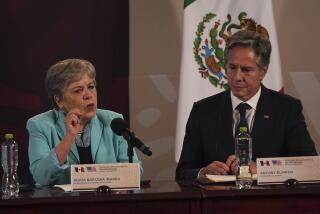Spain Goes After U.S. Business Opportunities
- Share via
MADRID — Struggling for more than a year to improve its troubled relations with Washington, Spain is investing big bucks in a new effort to expand Spanish business in the United States and enhance the Iberian country’s image before the American public.
For President Bush, the Spanish government may still be in the doghouse since pulling its troops out of Iraq. But Spanish officials are determined to move beyond the bitterness and boost interest in exports, investment and more diversified tourism.
“We’d like to convert the United States into a stable market for our exports,” Jose Montilla, Spain’s minister for industry, commerce and tourism, said. Spain represents an economy relatively unknown in the U.S., both as a producer and an importer, he said.
Montilla spoke ahead of a mission he is heading this week to several U.S. cities, including Washington and Miami, to promote the Spanish “brand” as part of a $100-million “Plan USA.” Spain, the promotion goes, is more than sun and Serrano ham: It also has scores of companies prepared to invest in technology, energy, pharmaceutical and other businesses in the United States.
Montilla said he also would be conveying a message from Prime Minister Jose Luis Rodriguez Zapatero that Spain would like “fluid relations” that increase and improve ties “in all fields.”
“It is very important, both for Spain and the United States, to overcome the chill of the [recent] past,” he said.
The political relationship between Madrid and Washington took a nose dive after the electoral victory of Zapatero and his Socialist party in March 2004, which ousted a right-wing government that had been especially friendly to the Bush administration.
Zapatero’s first action was to make good on a long-standing campaign promise to remove Spanish troops from Iraq, to the overwhelming approval of Spaniards but the great irritation of Bush.
Eighteen months later, there has still been no one-on-one meeting between the two leaders, and rhetoric has been harsh. It got so bad at one point that Bush refused to take Zapatero’s phone call of congratulations last year after the president won reelection.
In recent months, however, a series of fence-mending gestures have occurred on both sides.
Spain’s defense and foreign ministers have been received in Washington by their counterparts, and a new, friendlier and Spanish-speaking U.S. ambassador took up residence in Madrid. Bush reportedly thanked Zapatero at this month’s United Nations General Assembly for Spain’s offers of help for Hurricane Katrina victims.
Montilla said he was confident that the realm of politics had not tainted the realm of economics.
Spain’s investment in the U.S. is minuscule compared with that of Britain, France or the Netherlands. Traditionally, Spain has looked toward South America for most of its trade and business. But some analysts think Spain may be overexposed in that region and must channel its money elsewhere.
In contrast to several larger European countries, Spain has a relatively healthy economy.
Madrid-based economic analyst Paul Isbell said the effect that soured political relations might have on business was limited.
Only in the cases of business based on government contracts would it be an issue, he predicted.
“You can’t say it’s a complete myth, but it’s not really that important,” said Isbell, of Madrid’s Elcano Royal Institute of International and Strategic Studies. “Spaniards and Americans who can make money together will do it.”
Though no one can say that the cozy relations Madrid and Washington had under the previous government have been revived, many Spaniards think the recent arrival of the new American ambassador may help matters.
Cuban-born Eduardo Aguirre, a Bush appointee, has sought to minimize the estrangement. But he also pointedly reiterates the areas of dispute, including Spain’s recent decision to sell $1.7 billion in military boats and aircraft to the leftist government of Venezuela, whose president, Hugo Chavez, is a nemesis of the Bush administration.
Aguirre said his opinion of Spain had improved since his arrival.
“I feel that the relationship with the government is warming steadily ... and we are creating an element of personal trust among some of the players,” he said last weekend in an interview with the conservative Spanish newspaper ABC.
“The time that has passed has permitted us to recognize that two allies, like Spain and the United States, gain nothing with recriminations,” he said.
Spain is also a top destination for U.S. tourists. All told, tourism accounts for 10% to 15% of the country’s earnings. But Montilla said his nation would like to broaden the type of visitors it attracts and the parts of the country they visit, with the goal of developing a more “sustainable” tourism.
As it is, many Americans and northern Europeans think of bullfights, beaches and sangria when they think of Spain, Montilla and other officials say, but there is a gold mine of art, architecture and history to explore.
More to Read
Sign up for Essential California
The most important California stories and recommendations in your inbox every morning.
You may occasionally receive promotional content from the Los Angeles Times.













